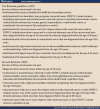The molecular basis of rectal cancer
- PMID: 25733974
- PMCID: PMC4336907
- DOI: 10.1055/s-0035-1545070
The molecular basis of rectal cancer
Abstract
The majority of rectal carcinomas are sporadic in nature, and relevant testing for driver mutations to guide therapy is important. A thorough family history is necessary and helpful in elucidating a potential hereditary predilection for a patient's carcinoma. The adequate diagnosis of a heritable tendency toward colorectal carcinoma alters the management of a patient disease and permits the implementation of various surveillance algorithms as preventive measures.
Keywords: adenoma-carcinoma sequence; colorectal cancer; hereditary cancer; molecular testing.
Figures
References
-
- Bhalla A, Zulfiqar M, Weindel M, Shidham V B. Molecular diagnostics in colorectal carcinoma. Clin Lab Med. 2013;33(4):835–859. - PubMed
-
- Brenner H, Kloor M, Pox C P. Colorectal cancer. Lancet. 2014;383(9927):1490–1502. - PubMed
-
- Kircher S M Mohindra N Nimeiri H“http://www.ncbi.nlm.nih.gov/pubmed/25410095”Cost estimates and economic implications of expanded RAS testing in metastatic colorectal cancer Oncologist 201520114–18. - PMC - PubMed
-
- Wendy De Roock, Bart Claes, David Bernasconi. et al.Effects of KRAS, BRAF, NRAS, and PIK3CA mutations on the efficacy of cetuximab plus chemotherapy in chemotherapy-refractory metastatic colorectal cancer: a retrospective consortium analysis. Lancet Oncol. 2010;11(8):753–762. - PubMed
Publication types
LinkOut - more resources
Full Text Sources
Other Literature Sources





